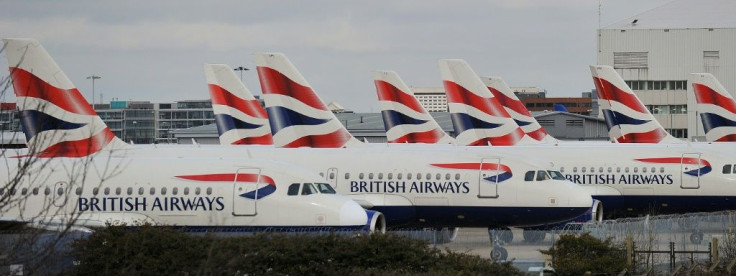British Airways Preparing To Suspend 36,000 Workers As Coronavirus Saps Demand

KEY POINTS
- British Airways will suspend 36,000 workers as demand disappears
- No workers are expected to be fired.
- British Airways has not asked the government for a bailout
British Airways, or BA, the flagship air carrier of the U.K., is planning to suspend 36,000 jobs, while the airline engages in discussions talks with trade union Unite.
The airline has reportedly reached an agreement with the union under which it will suspend 80% of its cabin crew, engineers, ground staff and head office workers. However, no workers are expected to be fired.
Suspended employees are expected to receive some of their salaries under the terms of the government's coronavirus job retention scheme, which will cover 80% of wages up to a maximum of £2,500 ($3,090) a month. Unite union reportedly sought a higher pay package for its members.
John Strickland, an independent aviation analyst, said that "tough negotiations" between BA and the Unite union has led to a prolonged series of talks and a delay in the final details of the agreement.
"The pilots' deal for half pay was concluded rather earlier, I guess there was a recognition as to just how serious that issue was," he said. (BA reached a separate deal with its pilots who agreed to a 50% pay cut over two months.)
The Sun reported that critical workers at BA who were not furloughed, such as call center staff and those involved in “live” operations, will remain on full salary.
A source told The Sun: “Negotiations have been tough but there is an acknowledgement at BA and the union that these are unprecedented times. Both sides are doing what they can for their loyal staff and members while ensuring that the airline survives.”
The GMB union has also been involved in talks with BA.
“GMB members working for BA are relieved to finally be nearing some sort of certainty after what has been an extremely worrying time,” said Nadine Houghton, GMB’s National Officer. “GMB and our sister union Unite have fought hard to secure members terms, conditions and job security. We believe the current deal, which is nearing its conclusion, secures this.’
Houghton warned however that “there are significant challenges for the aviation industry and whilst this current deal gives security for BA staff now, the government can’t take its eye off the ball. GMB is calling for more government intervention to protect the livelihoods of many more workers across the sector.”
BA has already grounded most of its fleet due to effects of the coronavirus crisis.
BA suspended all of its flights from London Gatwick and London City Airports – at these locations, the airlines has suspended 100% of its workers.
Tom Burridge, transport correspondent, BBC News, wrote: “No one who works at [BA] will be surprised… When the planes are sitting on the ground -- and nearly all of BA's fleet is doing just that, dispersed to regional airports around the country -- there is no need for the army of workers who fly the aircraft, maintain them, load and unload the bags, and serve the passengers.”
Burridge noted that staff typically account for 40% of an airline's costs, and BA should be able to reclaim 80% of wages from the government employment support scheme.
Thus far, BA has not asked the government for a comprehensive bailout, as other airlines, like Virgin Atlantic, have.
“So far the Chancellor [of the Exchequer], Rishi Sunak, has taken a hard line, saying airlines should exhaust all [other sources of funding] before turning to the taxpayer,” Burridge added. “If Virgin does make a formal application for more aid, it will have to be able to show it has met the chancellor's test.”
BA's parent company, International Airlines Group (IAG), has been profitable in recent years and has a stronger financial position than some of its rivals. The group has made healthy profits in recent years.
However, as airline bookings have collapsed, the International Air Transport Association said it expects airlines to incur losses of almost $40 billion.
© Copyright IBTimes 2025. All rights reserved.





















